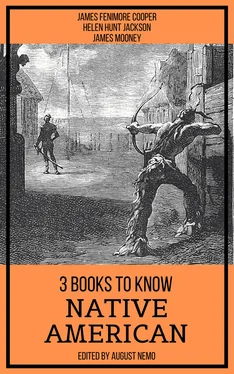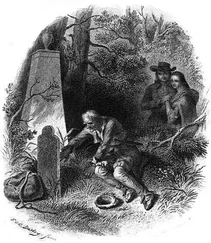The scene was at once animated and still. All that pertained to nature was sweet, or simply grand; while those parts which depended on the temper and movements of man were lively and playful.
Two little spotless flags were abroad, the one on a salient angle of the fort, and the other on the advanced battery of the besiegers; emblems of the truce which existed, not only to the acts, but it would seem, also, to the enmity of the combatants.
Behind these, again, swung, heavily opening and closing in silken folds, the rival standards of England and France.
A hundred gay and thoughtless young Frenchmen were drawing a net to the pebbly beach, within dangerous proximity to the sullen but silent cannon of the fort, while the eastern mountain was sending back the loud shouts and gay merriment that attended their sport. Some were rushing eagerly to enjoy the aquatic games of the lake, and others were already toiling their way up the neighboring hills, with the restless curiosity of their nation. To all these sports and pursuits, those of the enemy who watched the besieged, and the besieged themselves, were, however, merely the idle, though sympathizing spectators. Here and there a picket had, indeed, raised a song, or mingled in a dance, which had drawn the dusky savages around them, from their lairs in the forest. In short, everything wore rather the appearance of a day of pleasure, than of an hour stolen from the dangers and toil of a bloody and vindictive warfare.
Duncan had stood in a musing attitude, contemplating this scene a few minutes, when his eyes were directed to the glacis in front of the sally-port already mentioned, by the sounds of approaching footsteps. He walked to an angle of the bastion, and beheld the scout advancing, under the custody of a French officer, to the body of the fort. The countenance of Hawkeye was haggard and careworn, and his air dejected, as though he felt the deepest degradation at having fallen into the power of his enemies. He was without his favorite weapon, and his arms were even bound behind him with thongs, made of the skin of a deer. The arrival of flags, to cover the messengers of summons, had occurred so often of late, that when Heyward first threw his careless glance on this group, he expected to see another of the officers of the enemy, charged with a similar office; but the instant he recognized the tall person, and still sturdy, though downcast features of his friend the woodsman, he started with surprise, and turned to descend from the bastion into the bosom of the work.
The sounds of other voices, however, caught his attention, and for a moment caused him to forget his purpose. At the inner angle of the mound he met the sisters, walking along the parapet in search, like himself, of air and relief from confinement. They had not met from that painful moment when he deserted them on the plain, only to assure their safety. He had parted from them worn with care, and jaded with fatigue; he now saw them refreshed and blooming, though timid and anxious. Under such an inducement, it will cause no surprise that the young man lost sight, for a time, of other objects in order to address them. He was, however, anticipated by the voice of the ingenuous and youthful Alice.
“Ah! thou truant! thou recreant knight! he who abandons his damsels in the very lists!” she cried; “here have we been days, nay, ages, expecting you at our feet, imploring mercy and forgetfulness of your craven backsliding, or, I should rather say, back-running — for verily you fled in a manner that no stricken deer, as our worthy friend the scout would say, could equal!”
“You know that Alice means our thanks and our blessings,” added the graver and more thoughtful Cora. “In truth, we have a little wondered why you should so rigidly absent yourself from a place where the gratitude of the daughters might receive the support of a parent’s thanks.”
“Your father himself could tell you, that though absent from your presence, I have not been altogether forgetful of your safety,” returned the young man; “the mastery of yonder village of huts,” pointing to the neighboring entrenched camp, “has been keenly disputed; and he who holds it is sure to be possessed of this fort, and that which it contains. My days and my nights have all been passed there since we separated, because I thought that duty called me thither. But,” he added with an air of chagrin, which he endeavored, though unsuccessfully, to conceal, “had I been aware that what I then believed a soldier’s conduct could so be construed, shame would have been added to the list of reasons.”
“Heyward! — Duncan!” exclaimed Alice, bending forward to read his half-averted countenance, until a lock of her golden hair rested on her flushed cheek, and nearly concealed the tear that had started to her eye; “did I think this idle tongue of mine had pained you, I would silence it forever, Cora can say, if Cora would, how justly we have prized your services, and how deep — I had almost said, how fervent — is our gratitude.”
“And will Cora attest the truth of this?” cried Duncan, suffering the cloud to be chased from his countenance by a smile of open pleasure. “What says our graver sister? Will she find an excuse for the neglect of the knight in the duty of a soldier?”
Cora made no immediate answer, but turned her face towards the water, as if looking on the sheet of the Horican. When she did bend her dark eyes on the young man, they were yet filled with an expression of anguish that at once drove every thought but that of kind solicitude from his mind.
“You are not well, dearest Miss Munro!” he exclaimed; “we have trifled while you are in suffering.”
“’Tis nothing,” she answered, refusing his offered support with feminine reserve. “That I cannot see the sunny side of the picture of life, like this artless but ardent enthusiast,” she added, laying her hand lightly, but affectionately, on the arm of her sister, “is the penalty of experience, and, perhaps, the misfortune of my nature. See,” she continued, as if determined to shake off infirmity, in a sense of duty; “look around you, Major Heyward, and tell me what a prospect is this for the daughter of a soldier whose greatest happiness is his honor and his military renown.”
“Neither ought nor shall be tarnished by circumstances over which he has had no control,” Duncan warmly replied. “But your words recall me to my own duty. I go now to your gallant father, to hear his determination in matters of the last moment to the defence. God bless you in every fortune, noble — Cora — I may and must call you.” She frankly gave him her hand, though her lip quivered, and her cheeks gradually became of an ashy paleness. “In every fortune, I know you will be an ornament and honor to your sex. Alice, adieu”— his tone changed from admiration to tenderness —“adieu, Alice; we shall soon meet again; as conquerors, I trust, and amid rejoicings!”
Without waiting for an answer from either, the young man threw himself down the grassy steps of the bastion, and moving rapidly across the parade, he was quickly in the presence of their father. Munro was pacing his narrow apartment with a disturbed air and gigantic strides as Duncan entered.
“You have anticipated my wishes, Major Heyward,” he said; “I was about to request this favor.”
“I am sorry to see, sir, that the messenger I so warmly recommended has returned in custody of the French! I hope there is no reason to distrust his fidelity?”
“The fidelity of ‘The Long Rifle’ is well known to me,” returned Munro, “and is above suspicion; though his usual good fortune seems, at last, to have failed. Montcalm has got him, and with the accursed politeness of his nation, he has sent him in with a doleful tale, of ‘knowing how I valued the fellow, he could not think of retaining him.’ A Jesuitical way, that, Major Duncan Heyward, of telling a man of his misfortunes!”
Читать дальше












